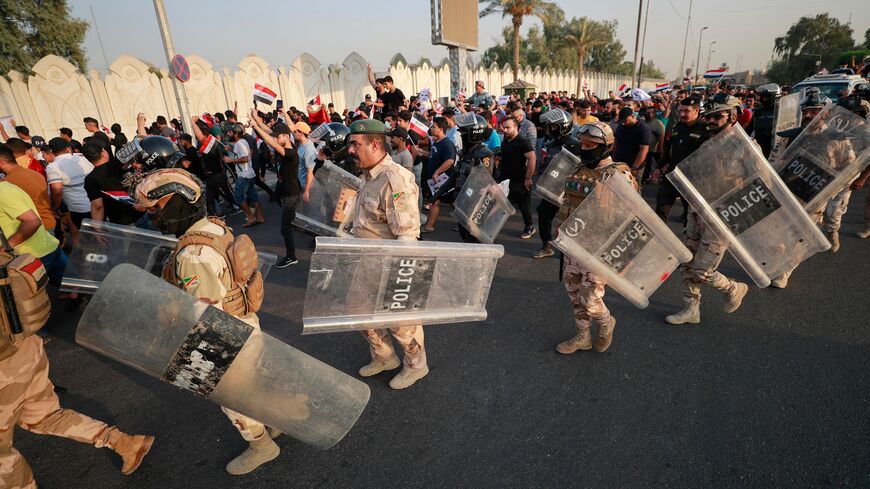Iraq's parliament on Monday finished the first reading of the amendment to the Provincial Council Elections Law, which regulates provincial council elections and the appointment of the governors. The amendment could enable Iraq's major parties to gain power vis-a-vis relatively new independent political actors.
Background: Iraq has two elections, per its constitution: one for parliament and one to form the provincial councils in charge of local governments. The last parliamentary elections were held in 2021, while the last provincial elections were in 2013.
The 2013 provincial elections were held in only 12 out of 18 provinces. The provinces in the Kurdistan Region and Kirkuk were excluded due to political disagreements, and Nineveh and Anbar were excluded due to security concerns prior to the Islamic State taking over these areas.
Iraqi Prime Minister Muhammad Shia al-Sudani included the provincial elections in his government program, and they are expected to be held in October of this year.
What it means: The new amendment will allow dominant political parties to expand their influence at the provincial level against the new-formed independent forces that arose from the 2019-2020 nationwide protests. The most controversial part of the new amendment is adopting the Sainte-Lague method to allocate seats among the political parties based on a party-list proportional representation system. Sainte-Lague doles out parliamentary seats using a quotient formed by dividing the number of votes a party received by the number of seats in parliament plus one. It favors established political parties and disadvantages small parties and independent forces.
According to Sherwan Al-Dobardani, who is a member of the parliamentary bloc for regions and provinces, the upcoming elections will deal with each province as a single electoral district, based on the Sainte-Lague law.
The representative of the former Prime Minister Nouri al-Maliki's State of Law Coalition, Baqir Al-Saadi, pointed out that there is still disagreement about what method of Sainte-Lague system to use. But whichever method is used, it will favor large political parties, enhancing the sectarian power-sharing between the three main Iraqi components: Shiites, Sunnis and Kurds.
The Coordination Framework, which includes the State of Law and nominated Sudani to become prime minister, is also seeking to integrate the parliamentary and provincial elections under one united law. If both elections were held at the same time, the winning forces could dominate both parliament and the provincial councils.
The current parliamentary elections law was passed in 2020 as a result of the nationwide Tishreen protests that began in 2019. It adopted the multiple-circle system, in which each candidate can be elected for only one specific circle and the votes go to individual candidates — not political parties. The previous law dealt with Iraq entirely as one circle and favored the large political parties due to the possibility of transferring votes from one candidate to another from the same party.
The current law opened the space for the independents and smaller parties to gain more than 40 seats in the last parliamentary elections 2021. But the new amendment seeks a return to the previous law.
In addition to changing the method of the elections, the amendment would also reactivate overseas voting and use manual counting instead of electronic counting.
Why it matters: The amendment discussed last Monday was proposed by the Coordination Framework along with their Sunni and Kurdish allies. The Coordination Framework supports the Sainte-Lague system, which benefits large parties by allowing them to transfer votes among their candidates.
Shiite cleric Muqtada al-Sadr's political allies will also be affected because their influence is stronger in specific areas. They benefited significantly from the last parliamentary elections which did not use the Sainte-Lague method. They won 74 seats in parliament, which was the highest number for them since 2003.
Since the Sadrists withdrew from the parliament, they do not have power to stop the new amendment. But they, and other independent forces, have already expressed strong objections. Multiple Sadrist sources confirmed to Al-Monitor that they will boycott the elections if the amendment is implemented.
Several newly-formed political parties, including Ishraqat Kanoun, Emtedad, and independent members of the parliament, also rejected the amendment.
It is expected that the religious authority in the Shiite holy city of Najaf will likewise not support the new amendment. Spokesmen of cleric Ayatollah Ali Sistani frequently supported the Tishreen protesters' demand to change the electoral law.
What's next: The amendment was discussed with little debate, and the parliament passed the first reading. It will be finalized after the second reading.
If Sudani fulfills his promise to organize an early parliamentary election, Iraq will see two elections this year: the parliamentary and the provincial together.
This could empower the Coordination Framework and expand their political domination, which in turn could create more social chaos, as independent forces and the Sadrists reject the amendment.
Moreover, it is expected that participation in the elections will drop significantly due to public loss of confidence in the political process. Voter turnout in 2018 and 2021 fell to less than 40% — the lowest figure since 2003. In such circumstances, emergence of new protests in Iraq seems logical.







